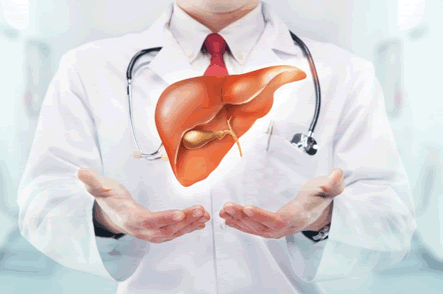
1. New discoveries could help treat |

![]() A new study, led by Dr. Guadalupe Sabio, shows that inhibition of two proteins with specific inhibitors has potential as a treatment for fatty liver disease. The results are published in the EMBO Journal. The two proteins, p38 gamma and p38 delta, control the accumulation of fat in the liver, a process linked to the development of insulin resistance and diabetes, which are common outcomes of obesity. These findings are presented in an article published by researchers at the Centro Nacional de Investigaciones Cardiovasculares Carlos III (CNIC).
A new study, led by Dr. Guadalupe Sabio, shows that inhibition of two proteins with specific inhibitors has potential as a treatment for fatty liver disease. The results are published in the EMBO Journal. The two proteins, p38 gamma and p38 delta, control the accumulation of fat in the liver, a process linked to the development of insulin resistance and diabetes, which are common outcomes of obesity. These findings are presented in an article published by researchers at the Centro Nacional de Investigaciones Cardiovasculares Carlos III (CNIC).
![]() Steatosis, the excessive accumulation of fat in the liver, is one of the most common diseases in developed societies. The consequences can be serious: fatty liver can trigger cirrhosis and hepatic failure, contributes to the development of diabetes, and can even lead to liver cancer.
Steatosis, the excessive accumulation of fat in the liver, is one of the most common diseases in developed societies. The consequences can be serious: fatty liver can trigger cirrhosis and hepatic failure, contributes to the development of diabetes, and can even lead to liver cancer.
![]() Using mice unable to express p38 gamma and p38 delta in neutrophils, a type of inflammatory cell, the research team showed that these two proteins control the migration of neutrophils to the liver. Therefore, inhibition of neutrophil migration in animals lacking p38 gamma and p38 delta would be enough to protect them from the development of fatty liver, thus preventing inflammation, liver damage, and even diabetes linked to obesity.
For Dr. Sabio, this discovery both advances understanding of the mechanisms underlying this disease, and also supports the development of new strategies to treat or even prevent the disease.
Using mice unable to express p38 gamma and p38 delta in neutrophils, a type of inflammatory cell, the research team showed that these two proteins control the migration of neutrophils to the liver. Therefore, inhibition of neutrophil migration in animals lacking p38 gamma and p38 delta would be enough to protect them from the development of fatty liver, thus preventing inflammation, liver damage, and even diabetes linked to obesity.
For Dr. Sabio, this discovery both advances understanding of the mechanisms underlying this disease, and also supports the development of new strategies to treat or even prevent the disease.
For enquiries info@jothydev.net.
Please visit: jothydev.net | research.jothydev.com | diabscreenkerala.net | jothydev.com/newsletter
